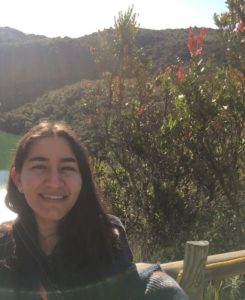 a. What is your background? Where are you from? What do you study? What are you most interested in, scientifically?
a. What is your background? Where are you from? What do you study? What are you most interested in, scientifically?
I’m a biologist with a Master’s degree in Biological Sciences from Universidad de Los Andes in Bogotá, Colombia. My main passion and interest is plant physiology and ecology and understanding mechanisms plants use to cope with stressful conditions in the field. In the recent years my research has been focused on thermal tolerance in tropical alpine paramo plants to assess their vulnerability to extreme events arising from climate change. But I’ve also worked in a long term warming experiment in paramos investigating changes in community composition and carbon fluxes; as well as with urban vegetation understanding links between plant functional traits and ecosystem processes.
b. Give us a brief summary of your internship project. What is the study system? Primary research questions? With whom are you working?
For the RECITE internship I worked with Sonya Geange, and a team of 13 more scientists residing in three different countries on a meta-analysis of patterns of thermal tolerance in terrestrial plants. There are many methods for assessing thermal tolerance for plants, however, we know relatively little about how well these methods compare to one another. Chlorophyll fluorescence approaches are among the most common, and are used to assess limits of photosynthetic performance with temperature. Here we are looking to answer two main questions: a) which of the two most commonly measured chlorophyll fluorescence parameters employed to determine thermal tolerance is more sensitive to temperature variability and, b) if variability and frequency of extreme temperatures could be better predictors of global thermal tolerance patterns than mean values. In order to respond these questions, we’re conducting a meta-analysis based off compiled information from thermal tolerance from studies conducted across species and ecosystems across the world.
c. What is your role in the research team in terms of tasks and responsibilities, and how do these relate to the aims of the research project?
My main role and tasks for the first part of the internship were centered on setting up the necessary references and data organization structure required to conduct a meta-analysis. This included compiling resources from trait databases, and existing publications. A key part of this process involved creating standardized, clear and easy instructions for data mining, with this part of the process essential to ensuring a comparable database that would not only help answer our study questions but will also help make the process reproducible. Now we are using this protocol to extract relevant information on thermal tolerance for the meta-analysis, and for the next part of the internship the main focus will be on data extraction using R and investigating global temperature data sources.
d. What were your specific goals for the upcoming internship? These can be both scientific and personal. Are you meeting, or did you (if the internship is complete) accomplish your goals? Please explain with specific examples if possible.
My main goal with this internship was learning about thermal tolerance in both temperate and tropical species and the relationship between local environmental conditions and thermal tolerance. I was also aiming to learn about the steps and process for doing a meta analysis since I’ve never worked on one before. Personally I was looking forward to collaborate with other scientist and to improve my skills in a collaborative environment. In this internship I’ve learned about tools for processing lists of references, gained skills on data extraction and learned the importance of reproducible science and its value for meta-analysis. Revising an extracting data from a big amount of papers had also helped me broaden my knowledge in the different methodologies employed for thermal tolerance assessment. Apart from this, collaborating with different researchers have been an enriching experience and has taught me how easily it can be done with the resources we have right now and in the face of the current emergency situation.
e. What skills or knowledge from your prior experience and education did you find useful during this internship? Did you develop any new skills or knowledge? Please explain.
I think during this internship I have used and improve my time management skills. Working part time and collaborating with people on different time zones, made organizing my time and dividing my day very useful, and has helped me complete the tasks I’m entrusted. Other valuable skills I’ve acquired until now are related to data management, and becoming familiar with different sources for reference lists and data querying. Also, previous knowledge on thermal tolerance has also helped me understand the main issues that aroused and to easily extract the information we were looking for in order to answer the study questions.
f. How has the COVID19 pandemic altered your plans or your experience during this internship?
With the current applications and tools we have to connect with people in other parts of the world and to work simultaneously, I think the pandemic actually provided me an opportunity to collaborate with other researchers working from home. My internship offered the possibility to work on a project that was of my most interest from the safety of my home, so I think this type of projects would be highly valuable and encouraged in the current pandemic.
Hi Indira, thans for a very nice blog! The pandemic was indeed what inspired us to advertise these remote internships – and while this might sound almost like a contradiction in terms, the truth (as your blog very nicely illustrates) is that a lot of research collaboration these days happens exactly like this, pandemic or not. People in diffierent timezones, working remotely on a shared task. I’m looking forward to learnigjn more about what you find!